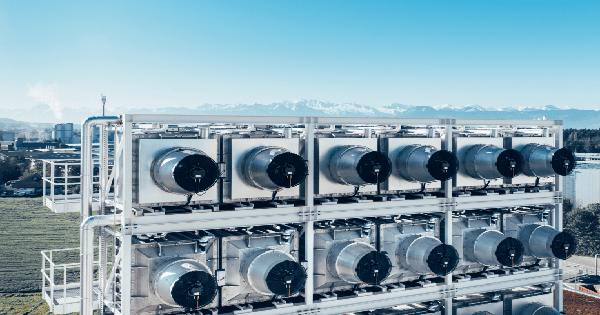In Iceland, a machine capable of extracting 4,000 tons of carbon dioxide from the atmosphere per year was recently turned on. The Orca plant, called after the Icelandic word for “energy,” is the world’s largest carbon removal facility, turning emissions into minerals that may be stored permanently deep underground.
Orca, designed by Climeworks in Switzerland, employs fans to suck air into eight enormous metal boxes. Carbon dioxide is then captured on the surfaces of these collector units by highly selective filters.
The collectors are closed once the filters are full, and the temperature is increased to between 80 and 100 degrees Celsius (176 to 212 degrees Fahrenheit). Carbon dioxide is released, which can be recovered as a highly concentrated gas.
This carbon dioxide is subsequently dissolved in water and buried deep into the underground basalt rock formations, according to technology created by the Icelandic company Carbfix. The carbon in the solution crystallizes into carbonate minerals, which fuse with the rock and become permanently imprisoned, over a two-year period.
According to the company’s website, “Climeworks’ cooperation with Carbfix ensures the safe storage of CO2 through subsurface mineralization.” “The subterranean basaltic rock formations in Iceland provide optimal conditions for this process, resulting in a long-term CO2 storage solution.”
Orca is fueled by the Hellisheidi Geothermal Power Plant, which provides 100% sustainable geothermal energy. Climeworks claims that the facility’s “grey emissions” are controlled to less than ten percent as a result of this. To put it another way, for every hundred tons of carbon absorbed, at least 90% is permanently eliminated and just 10% is re-emitted.
The facility took slightly over a year to construct and opened to the public on September 8. Orca can currently remove enough carbon to equal the emissions produced by 870 cars, while Climeworks hopes to expand the plant’s capacity in the coming years.
While many people feel that carbon capture is a crucial part of the worldwide fight against climate change, others believe that the cost of developing and operating plants like Orca makes them uneconomical. Individuals who want to decrease their carbon footprint can buy carbon offsets from Climeworks for $1,200 per ton of carbon dioxide, according to Bloomberg.
By the middle of the next decade, when Orca is expected to achieve full operational capacity, the business intends to cut the price to less than $200 per ton of CO2. Carbon offsets would become far more appealing to polluters if this were done, as the costs would be significantly lower than those incurred by paying penalty fees for high emissions.
















